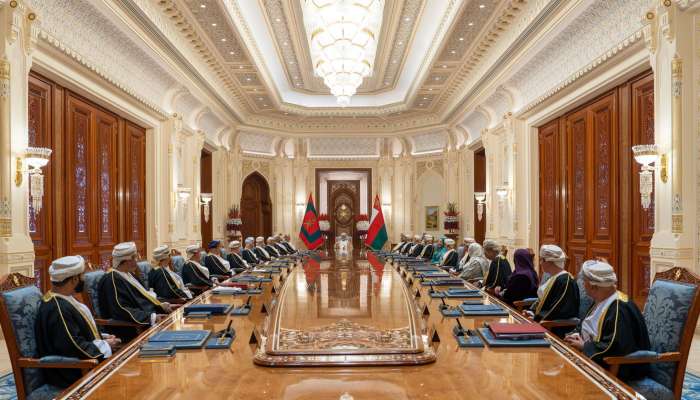
Salalah: His Majesty Sultan Haitham bin Tarik presided over the Council of Ministers meeting at Al Mamourah Palace in Salalah.
The Council of Ministers examined the outcomes of the Government Digital Transformation Programme (2021-2025), highlighting key milestones such as the introduction of the unified national services portal, the approval of regulatory guidelines for digital governance, and the digitisation of 74% of all government services.
The programme also featured the implementation of multiple artificial intelligence projects and positioned Oman as a regional hub for data processing and AI algorithm development. These collective efforts have elevated Oman's standing to 45th globally and 5th within the Middle East and North Africa region on the Government AI Readiness Index.
The Council of Ministers has examined the initial outcomes of the State General Budget for 2025, noting that the Gross Domestic Product at constant prices recorded growth of 3.4%, driven by enhanced value-added in non-oil activities.
The year further witnessed the introduction of various projects and programs in multiple social and economic development sectors.
The Council reviewed the components of the draft State General Budget for the 2026 fiscal year, which constitutes the inaugural year of the Eleventh Five-Year Development Plan (2026-2030).
HM the Sultan issued directives emphasising the necessity of a unified national effort to realise the objectives of the forthcoming development plan and to strive for elevated economic growth rates.
This mandate includes the implementation of suitable mechanisms to strengthen the national economy, broaden its composition, and diversify revenue streams.
HM has called for devising essential solutions to overcome challenges impeding the execution of employment and training initiatives, underscoring the priority of creating job opportunities in all sectors of the economy.
HM the Sultan has underscored the critical importance of consolidating the progress attained and of persistently maintaining the drive to elevate the Sultanate of Oman's standing across these indicators. He reiterated the necessity of reinforcing economic and social stability, boosting the competitiveness of the national economy, and capitalising on the review and assessment of outcomes from the previous plan to realise the goals of Oman Vision 2040.
His Majesty also highlighted that the favourable results yielded by the current plan serve to bolster confidence in the nation's future development trajectories.
HM the Sultan has commended the outcomes and metrics delivered by the Tenth Five-Year Development Plan, along with the targets set for the Eleventh Plan.
HM commended the efforts of all units of the State Administrative Apparatus and the private sector, acknowledging their dedication to executing diverse development programs and projects. These collective efforts have substantially strengthened Oman's fiscal position and economic performance, resulting in measurable progress across key economic indicators.
HM the Sultan has directed the creation of a new undersecretary-level sector within the Ministry of Social Development structure. This sector will be responsible for supervising all initiatives aimed at improving services for persons with disabilities, addressing sector-specific challenges, promoting their effective empowerment and inclusion to enhance their role in societal development and facilitating educational access across all levels.
The Council of Ministers has underscored the importance of enhancing the national employment platform "Tawteen" by establishing a suitable mechanism to increase the number of registered companies and finalizing the linkage of its relevant databases. These measures aim to utilize the platform's data to create employment opportunities for citizens. Launched in December 2024, the platform provides supply and demand data for positions, lists available job opportunities in the public and private sectors, and maintains data on jobseekers.
HM the Sultan has directed that the sum previously allocated to support programs and pathways for employing jobseekers in the private sector—particularly the wage support initiative—be doubled to an amount of (OMR100) million, in light of the substantial uptake of these initiatives and programs by both the private sector and jobseekers.